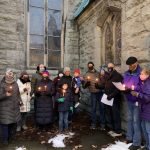The photo above is courtesy of Pixabay.
Article by Peter Koeppel, member of Trinity Memorial Church in Binghamton and the diocesan Stewardship Resources team.
Do you realize just how unusual Jesus’ ministry in this world was? He taught in the temple; He interpreted scripture; He preached to crowds; He didn’t despair when His disciples kept failing to “get” His ministry. When an attempt was made to entrap Him into opposing a worldly power structure, He didn’t take the bait. Not until His last week in this world did He openly expose corruption in, and collusion between, religious and worldly powers by overturning the money changers’ tables in the temple in Jerusalem. We know how that ended.
At this time of the year, though, we focus on what came long before His ministry: His mother’s acceptance of her holy pregnancy; His father’s acceptance of the “out-of-wedlock” pregnancy of his future wife; His birth; the threat His birth posed to the Jewish worldly authorities, and flight to escape with their lives. We’ll stop there, for now.
What lessons do we learn from these events? Both the beginning and the end of Jesus’ life on earth are book-ended by the authorities. His parents’ travel to the city of David was in compliance with an order of the Roman authorities. His birth threatened the power of the Jewish king. Him being perceived as a threat to Jewish both worldly and religious authorities led to His brutal execution.
In between, He taught us what the Kingdom of God is about: embrace of the stranger—not xenophobia, dominion, or genocide; charity and economic fairness toward the poor—not exploitation; standing up for the oppressed—not inequality; caring for the ill—not abandoning them to their own devices; listening to the voices no one hears—not preoccupation with oneself; speaking truth to power on behalf of those not heard—not silence. All of these violations of the Kingdom of God are expressions of collective, societal failure, not individual failure. As such, they are perhaps especially insidious, as they reflect attitudes, prejudices, even heartlessness all embedded in our daily behaviors, customs, and laws. This makes them harder to correct than whatever our individual failures may be.
As Christians we are individually challenged to see these collective failures as, and for, what they are. If we truly are to follow in Jesus’ footsteps, complacency—in the face of xenophobia, exploitation, inequality, abandonment, self-absorption, and silence—is not the love for our neighbors we are commanded to show. Correcting these societal failures starts with each of us, by honestly examining how we contribute to their persistence. We may not like the answers, but unless we honestly and prayerfully look at ourselves and learn to see where our own assumptions, gut feelings, or convictions have allowed societal failures to persist (if not outright contributed to them), and we work on ways to remove, if not reverse our contribution to them, our prayers that God’s “kingdom come” ring hollow. When we pray “thy kingdom come”, we must acknowledge that we have an active part to play in making it come to be in this world.
When we let the panoply of persons who represented the highest ideals of Christian love pass before our eyes, we find Mother Teresa, who led others in caring for the sick and the poor. We also find persons deeply engaged in societal and political life, such as Dr. Martin Luther King, Jr., Rep. John Lewis, Dietrich Bonhoeffer, and so many others, many of whom paid with their bodies and lives for standing up to hate, xenophobia, racism.
There is a call for any one of us. For a few of us to be the leaders, for many of us to be followers, or teachers, or healers. All of us are needed, and all of us are called to rectify these societal failures. Some of us are called to address them at their root cause, others to address their daily fallout, and all of us to bring the Kingdom of God a little closer. Let’s heed the call!


